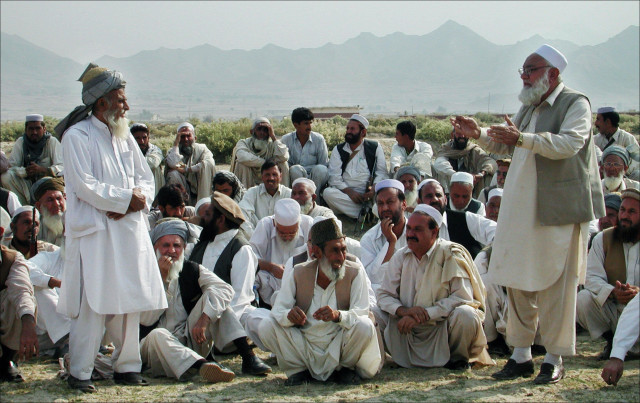In times of trouble: Two new tribal committees in Khyber to keep the peace
Political admin arrests 40 more Torkhel tribesmen under FCR, taking total to 85.

Shalobar and Zakhakhel tribes of Khyber Agency have announced the formation of two peace committees on Sunday to aid the government with the completion of developmental schemes. This development comes in the wake of continuing violence in the agency as well as several attacks on peace lashkars across the province.
Tirah Deputy Commandant Brigadier Colonel Hafeez, Khyber Agency Additional Political Agent Ghulam Habib Marwat and Bara Assistant Political Agent (APA) Nasir Khan spoke to the newly-formed committees. Haji Kaptan was announced as the head of the Shalobar peace committee, while Haji Baildar was made chief of the Zakha Khel committee. The announcement was made by the elders of both tribes in separate jirgas, where a large number of tribesmen were in attendance.
Tribal elders and government officials agreed on 40 names for each committee, with the aim to bolster peace efforts and bridge the gaps between them for the development of the agency. The officials urged locals to forge unity in their ranks for the sake of restoring peace and maintaining law and order.
“The tribesmen of Khyber Agency need to weed out elements that are hindering development in their land and spreading unrest,” said APA Nasir Khan while addressing the participants.
Tribal elders vowed to offer their help to the political administration and security forces, adding they could no longer afford to be left behind in development schemes as compared to other parts of the country. They appreciated K-P Governor Mehtab Abbasi’s announcement of allocating over three billion rupees for uplift schemes in Tirah Valley, a first for the region.
The political administration officials, meanwhile, said merit will be given preference when conducting welfare schemes in the area and all peace committees will be taken on board.
Respecting sacrifices
Tribal elders demanded the government release Rs25,000 to displaced tribesmen returning to their homes. They complained that families who had lost loved ones and whose property had been damaged during the military operation had not been given the announced Rs400,000 compensation so far.
The Zakha Khel tribesmen said they had been deprived of food packages, while displaced people from their tribe were not given an “IDP status” either. They urged the government to provide incentives to various tribes through development schemes and establish a model school in Zakha Khel.
Archaic laws
As tribesmen from Shalobar and Zakha Khel formed peace committees to help the government, men from the Torkhel tribe were arrested for being guilty by association under the Frontier Crimes Regulation.
At least 40 more Torkhel tribesmen were arrested in the agency on Sunday from Sor Kamar, bringing the total number of people detained under the FCR’s collective responsibility clause to 85.
The men were nabbed in wake of recent attacks on Nato tankers, in which three men were killed and two injured, while two tankers were also set ablaze. Locals said the oil tankers were carrying fuel for Nato forces in Afghanistan and were targeted by unidentified militants.
The tribesmen were put in lock-up and the administration ceased all government incentives to the tribe, including the payment of salaries as well as the registration of CNICs and domiciles. It was reported that 80 shops belonging to tribesmen were also shut down by the administration, which locals termed an injustice and equated it to the “financial murder” of the tribe.
Jamiat Ulema-e-Islam-Fazl leader Kabir Afridi claimed the FCR clause to arrest tribesmen under the collective responsibility had ended in 2012 with the FATA reforms, calling the recent detentions “an act of cruelty”. Afridi said if the political administration failed to release the prisoners and reopen shops, tribesmen would block the Pak-Afghan Highway in protest.
After Thursday’s attack on the Nato oil tankers, the Jamrud political administration arrested 45 tribesmen from Torkhel, Sher Khan Khel and Manya Khel under the aforementioned clause and put them in lock-up.
“The attackers were riding motorcycles and armed with light and heavy machine guns,” explained an official. “They first opened fire at three oil tankers and then hurled petrol bombs.”
Published in The Express Tribune, August 25th, 2014.













COMMENTS
Comments are moderated and generally will be posted if they are on-topic and not abusive.
For more information, please see our Comments FAQ